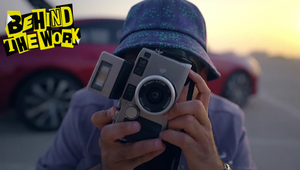
Creativity's Role while the Lebanese Are "Drowning in their Problems"

There is a lot to be said about those who stay resilient in the face of adversity and it would seem that the citizens of Lebanon are well versed in picking themselves up after catastrophe and getting on with their lives. With that in mind Rita El Hachem, executive producer and partner at Stoked Films, a self-proclaimed ‘war child’ after having grown up during the Lebanese Civil War has overcome plenty of challenges to get to where she is today.
Here she speaks to LBB’s Natasha Patel about her childhood, why she believes the people of Lebanon are able to laugh their troubles off and how having such a large proportion of the young population is going to drive the area’s creative industry forward.
LBB> It would be hard to talk without mentioning Covid-19, what is the situation with the virus in Lebanon like right now?
Rita> The pandemic has been actually under control in Lebanon because the government took measures very early on when we had less than 100 cases which kept cases to a total of around 2000. So the country is open, businesses are open and they opened the airport at the beginning of July. Since the airport opened we’ve started seeing a small rise in the cases. There was an economic collapse that happened early on in October 2019, so it's quite dire times for us here.
LBB> What has the pandemic and economic collapse done for the country’s creative industry?
Rita> In terms of production companies in Lebanon, usually 90% of their work is not for the Lebanese market because Lebanon is too small. However Lebanon is the hub for productions for the region especially for the Gulf countries.
So creative agencies here, of course, have been hit big time because their local clients have been tremendously affected. I think they’re doing more work for their networks out of here because they have the creative experience. Now in Lebanon there has been a crash in the exchange rate of the Lebanese pound, which means that now suddenly Lebanon has become too cheap for work coming from abroad.
LBB> How does the creative style of Lebanon differ to other countries within the Gulf area?
Rita> There are cultural boundaries. When you talk pan-Arab that’s quite vast because what applies as cultural censorship and cultural acceptance in Saudi is not the same that is in Jordan, Lebanon, Egypt. So it's like walking on eggshells, it's actually very challenging for creatives to be creative in the region, to be witty, edgy while taking in consideration all of the censorships.
Now it is changing. Four years ago whenever we portrayed a lady in Saudi Arabia we always had her in a veil even if she was inside her house, in the past year and a half things have been changing so now we can have her inside her house without a veil and so on. It is changing but they do have lots of boundaries to work within.
LBB> How did the public react to these newer portrayals of women?
Rita> This is a government decision, it wasn’t a cultural shift. Since the ruling figure of Saudi Arabia decided to move Saudi Arabia into a modern path, even if people didn’t embrace it, they’re being vocal about now embracing it.
LBB> These new perspectives will of course appeal to the younger consumers, are these the ones who are driving conversations around communications?
Rita> Definitely. We are hopeful because of our youth. Myself, I am a war child, I grew up during the war. All the kids who were born between 1990 and now didn’t go through the same things. For me I would say I am going to power through this and its just one more storm that I need to power through. For me, if I wanted to I can easily relocate to the UAE because we have an office there but I choose to live here.
So having a big proportion of the Lebanese people being young is definitely our hope to bounce back, not only in the advertising world but across different fields.
LBB> Tell us more about your childhood and your career path to starting up Stoked.
Rita> My childhood applies to all of my generation. I was born in 1976 and one year before that the war broke out in Lebanon so throughout our childhood there was war and we used to run whenever there was an explosion or were hit by shells.
We would live for a month with different families around us in bunkers under our houses. But I can’t say my childhood was a sad one, whenever the battle stopped we were playing and happy kids. I don’t know how we went to school because eventually we finished our high school in 1989, it was the last year of the war in Lebanon. Many years we would go to school for three, four, five months and I don’t know how we grew up to speak French, English and Arabic at the same time.
I went to university; I always wanted to work in production and specifically advertising. But my parents were against the idea, they were more traditional, they wanted me to pursue medical studies – obviously I hated that. They kept fighting me to the end and I became an interpreter. I have a master’s degree in interpretation and I worked at that for a while and translated books.
Eventually, when I became financially independent, I pursued a master’s degree in film production. Upon receiving my master’s degree, maybe I was 29 years old at the time, I moved to Dubai because it was 2006 and Lebanon was being attacked by Israel and they were wreaking havoc and destroying all of our infrastructure. I moved to Dubai and was offered a job in a production company and I started there, and in 2009 I was offered a partnership with Joy Films who were a production arm of RSA in London. In 2012 we parted ways and my husband Charbel aouad and I started Stoked
LBB> So now that you’ve ended back in Lebanon would you say Beirut is the creative hub of the country?
Rita> Definitely, Beirut is the capital and is the only big city. Lebanon is too small, it's only 10,250sq km and the whole population is six million people. Almost two million of them are Syrian refugees and probably 750,000 of them are Palestinian refugees. It’s a very, very small place.
But somehow when I arrive in London I would feel the same vibe: there is a chaotic creative vibe in the city. One good thing, despite all of the hardships we are going through right now, there is one thing I hate and at the same time admire about the Lebanese is that they are capable of laughing. Sometimes too much laughing is not good and you need to be very serious and grave about it!
LBB> From the sounds of it, the people of Lebanon have a lot of resilience.
Rita> Lebanon is a very rich and old country. Two of our cities are in the top 10 continuously inhabited cities of the world: Byblos and Tyre in the south of Lebanon. We have lots of ruins and in the Beqaa [Valley] not far from Syria we have the beautiful, stunning and one of the best-kept Roman temples in the world named after the city of the sun. One of the music festivals historically took place there every summer with big international names. This year with the pandemic all music festivals around the world have been cancelled. But despite all of our hardships, poverty and the collapse, what they did was fantastic. They hosted a live broadcast for one night in homage to the Lebanese resilience. http://www.baalbeck.org.lb/
LBB> What drives Lebanese consumerism?
Rita> Lebanon now is going through a very specific case with the current situation. In October we had a revolution but it did not lead anywhere, one government resigned to have another take over. Not much has changed but what has and drastically, is that we have had suddenly had the financial system collapse. It was bound to happen, it has been engineered since 1992 to reach this point that happened in October 2019. You can’t access your funds in the bank because there is an illegal control and the government is powerless almost, it’s all controlled by the banks.
In Lebanon it's very weird, we have had since 1992 established a fixed rate to the US dollar so we dealt in either oil currency or dollars. Suddenly, in October when this crash happened it became out of control, the central bank did not have foreign currency anymore and the banks illegally transferred whatever reserves they had in foreign currency outside the country to protect themselves. So basically the people now are paying the price - every Jane and Joe is paying the price.
The Lebanese now, are not open to any advertising communication, they are drowning in their problems, also there are the US government sanctions. It’s a very, very complex situation. The people really are struggling. People who are middle class and had jobs are now jobless, whatever savings they had they don’t have access to them, so you know how people talk about the nouveau riche everywhere in the world, well in Lebanon we have the nouveau poor, people who are not supposed to be poor but suddenly they are really poor. All this happened from October to now. The pandemic aggravated the situation even more because more businesses closed.
LBB> Will the upcoming festivities for Eid al-Adha encourage brands to create campaigns?
Rita> This Eid in Lebanon has never been big. We never have massive communication for Eid in Lebanon - even Ramadan isn’t massive. But for the region in the Gulf it used to be big but this year clients are not spending. Brands did not spend a penny on production instead of communications during Ramadan and that is our Christmas.
If people were going out you would be telling them about this product or that. Brands, they recycle their old campaigns and refurbish them here. They rerun old campaigns. Now Dubai is open, and Saudi Arabia although they have a big rise in cases on a daily basis but there isn’t this burst in advertising comms that we used to see for Eid. Probably telecoms are doing some stuff but on a smaller scale than they used to do.
LBB> What are Stoked working on right now?
Rita> We work a lot with the international committee of the Red Cross directly, the United Nations and government entities in the Gulf. So now we’re working on a couple of projects for them plus the usual commercial work.
What they advertise a lot here is back to school but there is no guarantee there is any back to school with the pandemic. So I do understand the hesitation on giving go ahead on projects because they can't be sure what they’re going to communicate.
LBB> Lastly, the country – and the whole world – is going through a completely unpredictable period right now but do you have plans and hopes for the future?
Rita> Stoked are equally present in Dubai and Lebanon, when Lebanon is in a recess or suffering we are working more form Dubai. But the long-term would definitely be for us to persist, I wouldn’t want to shut down any operation of ours in Lebanon. Definitely what we want to branch out now is the content creation and we have developed a feature film.










